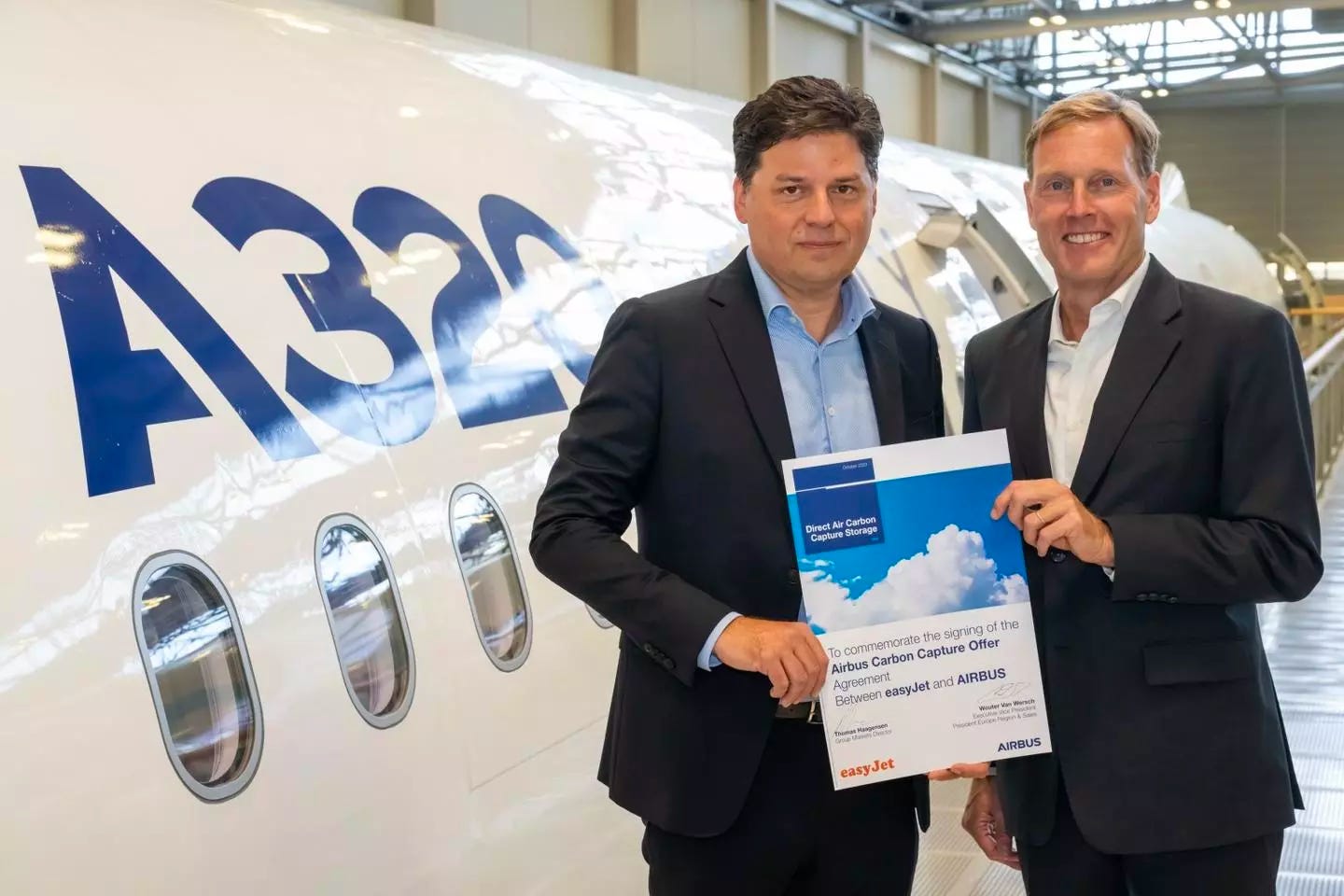#Sustainability20: Wisk Aero Starts Flight Testing Electric Autonomous Aircraft & More
Weekly Roundup - 13/10/23
Each Friday, we publish a round-up of the 20 most important stories on sustainable aviation. You can see previous editions of #Sustainability20 here.
Industry Updates
EasyJet has partnered with Airbus for a carbon removal initiative using Direct Air Carbon Capture and Storage (DACCS) technology. This system extracts CO2 emissions from the air and stores them underground. EasyJet had previously shown interest in pre-purchasing verified carbon removal credits from Airbus.
ACI EUROPE has warned that the French Government's proposed tax on major French airports could hinder their decarbonisation plans set for 2026-2030. The tax, framed as ecological, could harm both environmental efforts and the economy. Olivier Jankovec of ACI EUROPE criticised this as "policy greenwashing" that threatens shared objectives.
CLIMATE WATCH: In Provence, Winemakers Confront Climate Change - The New York Times
Climate change is altering the taste and quality of wines, particularly impacting weather-sensitive grape vines. European vineyards, central to global wine production, are facing challenges like extreme weather and dwindling water supplies. Some vineyards are adopting sustainable, organic cultivation practices, seeking higher altitudes, or experimenting with different grape varieties. Regulations and traditional classifications limit certain adaptive measures, stressing the wine industry.
Infrastructure and operational efficiencies
Vistara will use SITA's eWAS and OptiClimb solutions to enhance flight safety, planning, and operations. The technology aims to reduce fuel consumption, improving efficiency and lowering carbon emissions. OptiClimb uses machine learning to predict fuel burn, potentially saving Vistara over 5,000 tonnes of fuel and reducing carbon emissions by over 15,000 tonnes annually.
The U.S. Department of Energy's Athena project, led by the National Renewable Energy Laboratory, aims to electrify airport operations, focusing on rental cars at Dallas Fort Worth International Airport (DFW). Athena's next phase, Athena ZEV, will address the infrastructure challenges of increasing electric vehicles in rental fleets and other transportation modes. Solutions developed will be applicable to other airports, promoting broader airport electrification.
Mexico leads Latin America with the most airports in the Airport Carbon Footprint Accreditation Program (ACA). Mexico has 35 out of 71 airports participating, including major ones like AICM and AIFA. The ACA program aims for net zero emissions through various certification levels.
Sustainable Aviation Fuel (SAF)
United Airlines is marketing its commitment to SAF. However, United's actual SAF consumption lags behind its claims. European airlines lead in SAF usage due to strict EU regulations. United has called for government financial incentives for SAF, instead of consumer price hikes, pushing the responsibility of decarbonising air travel to the public.
LATAM Airlines CEO Roberto Alvo warns Latin America lags in SAF production, jeopardising net-zero goals. Despite LATAM targeting 5% SAF usage by 2023, South America produces no SAF. Alvo calls for clear policies to encourage SAF production, emphasising different challenges faced by Latin American carriers and urging measures that don't impose unsustainable costs.
UAE's Masdar and US's Boeing are partnering to boost the SAF industry worldwide, aiming for net-zero emissions by 2050. The collaboration will focus on developing SAF policies. They announced the partnership at the Adipec conference in Abu Dhabi.
The U.S. Department of Energy is investing $16.7 million in five projects to promote affordable biofuels and reduce GHG emissions. Supporting the SAF Grand Challenge for net-zero emissions by 2050, these projects focus on sustainable feedstock and conversion tech for hard-to-decarbonise products, aligning with DOE's Clean Fuels & Products Shot and biotechnology goals. The efforts target syngas conversion and biochemical product development, aiming to bolster the U.S. bioeconomy and job creation.
Boeing inaugurated a technology centre in Brazil to leverage local expertise in SAF production. Following a halted deal with local planemaker Embraer, Boeing aims to develop Brazil's aerospace ecosystem. The country's biofuel expertise positions it as a leader in the airline industry's decarbonisation efforts. Local industry groups have criticised Boeing for hiring away local talent, but the company believes its presence will benefit Brazil's aerospace sector.
New technology: Electric and Hydrogen
Wisk Aero is testing its autonomous air taxi, Cora, in Los Angeles, but hasn't confirmed a commercial launch in the city. The Boeing subsidiary is advancing towards commercialising its sixth-generation autonomous aircraft pending U.S. Federal Aviation Administration (FAA) certification. Wisk currently has experimental certification for its fifth-generation model and has tested it in multiple locations.
Joby Aviation's eVTOL prototype has been piloted by four onboard test pilots for the first time in California. The testing program, led by Chief Test Pilot James Denham, simulated daily operations and will aid in obtaining Federal Aviation Administration certification. Joby has also been conducting remote piloted tests and preparing for commercial sales, announcing a $500m factory in Ohio with an annual production capacity of 500 aircraft.
Universal Hydrogen has initiated a two-year test of its hydrogen conversion kit on a Dash 8-300 aircraft, enabling regional planes to use hydrogen fuel. The zero-emission Dash 8's first flight occurred earlier this year. The recent test demonstrated reduced noise and the hydrogen powertrain's capabilities. The campaign will optimise the powertrain, add new hardware, and begin certification testing for FAA requirements. Universal Hydrogen is collaborating with Air New Zealand for a lower-emission fleet by 2030.
Honeywell and GranBio will collaborate to produce carbon-neutral SAF from biomass residues. Combining Honeywell's ethanol-to-jet (ETJ) technology with GranBio's cellulosic ethanol AVAP® tech, the SAF can achieve net-zero greenhouse gas emissions compared to regular jet fuel.
EHang has supplied five EH216-S autonomous aerial vehicles to Shenzhen Boling Holding Group for sightseeing in Shenzhen, China. Boling may buy 100 units, pending EHang's certification from China's aviation authority. EHang, nearing its certification, aims for commercial urban air mobility in Shenzhen, collaborating with the local government. They'll also offer the aircraft for various tasks, including cargo.
German Aerospace Center DLR acquired a Dornier 328-100, named D328 UpLift, to test hydrogen propulsion technologies. Supplied by Deutsche Aircraft, it promotes open collaboration with various partners. Funded by the German government, the project supports sustainable aviation advancements.
Electric Hydrogen (EH2) secured an oversubscribed $380 million Series C financing to expedite the manufacturing and deployment of its green hydrogen systems. The funding, led by Fortescue, Fifth Wall, and Energy Impact Partners, supports EH2's mission to replace natural gas and coal with cost-effective green hydrogen. The firm plans to produce commercial electrolyser systems in 2024, targeting industries needing decarbonisation.
Beta Technologies opened a Vermont facility with the potential to produce 300 aircraft annually. Located at Patrick Leahy Burlington International Airport, this 188,500-square-foot facility will assemble Alia CTOL and Alia VTOL for various clients, creating many jobs. The site is designed for expansion and sustainability, incorporating geothermal wells and solar panels.
Wright Electric aims to produce electric planes for short flights by 2027. They're partnering with entities like easyJet and NASA. The company will retrofit a 1983 BAe 146 aircraft with electric motors by 2025. They're also developing high-energy-density batteries, aiming for 1,000 Wh/kg, enabling broader electrification in transportation. Initial battery tests are scheduled for 2025, with commercial rollouts by 2027.
Japan's Ministry of Economy plans to allocate 30.6 billion yen ($205 million) to support electrified aircraft technology. 17.3 billion yen is for hydrogen fuel cell systems, and 13.3 billion yen for fuel-saving technologies. This move aims to compete in the emerging hydrogen-powered aircraft market, with prototype trials set for 2030. Japan intends to lead in setting international standards for aircraft fuel cell systems. The funding comes from the Green Innovation Fund.







